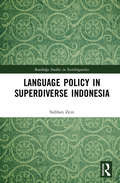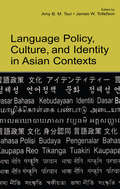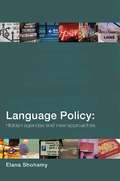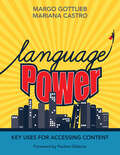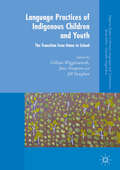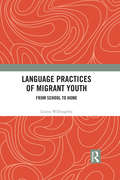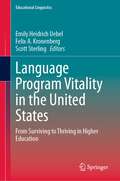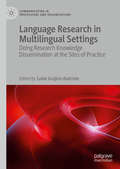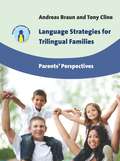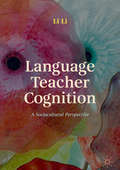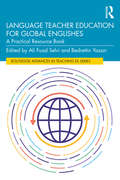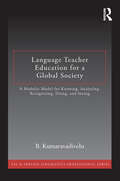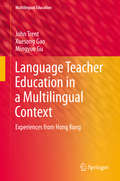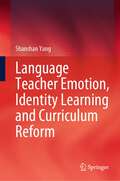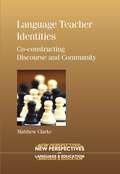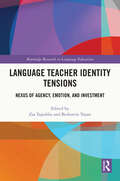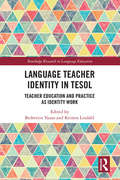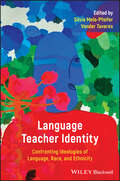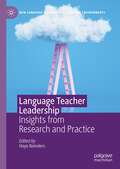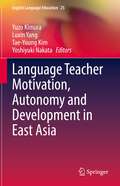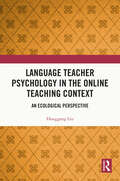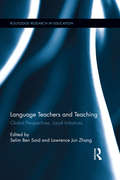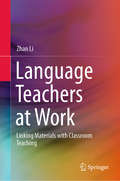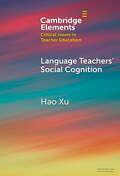- Table View
- List View
Language Policy in Superdiverse Indonesia (Routledge Studies in Sociolinguistics)
by Subhan ZeinIndonesia has an extreme diversity of linguistic wealth, with 707 languages by one count, or 731 languages and more than 1,100 dialects in another estimate, spoken by more than 600 ethnicities spread across 17,504 islands in the archipelago. Smaller, locally used indigenous languages jostle for survival alongside Indonesian, which is the national language, regional lingua francas, major indigenous languages, heritage languages, sign languages and world languages such as English, Arabic and Mandarin, not to mention emerging linguistic varieties and practices of language mixing. How does the government manage these languages in different domains such as education, the media, the workplace and the public while balancing concerns over language endangerment and the need for participation in the global community? Subhan Zein asserts that superdiversity is the key to understanding and assessing these intricate issues and their complicated, contested and innovative responses in the complex, dynamic and polycentric sociolinguistic landscape of Indonesia that he conceptualises as superglossia. This offers an opportunity for us to delve more deeply into such a context through the language and superdiversity perspective that is in ascendancy. Zein examines emerging themes that have been dominating language policy discourse including status, prestige, corpus, acquisition, cultivation, language shift and endangerment, revitalisation, linguistic genocide and imperialism, multilingual education, personnel policy, translanguaging, family language policy and global English. These topical areas are critically discussed in an integrated manner against Indonesia’s elaborate socio-cultural, political and religious backdrop as well as the implementation of regional autonomy. In doing so, Zein identifies strategies for language policy to help inform scholarship and policymaking while providing a frame of reference for the adoption of the superdiversity perspective on polity-specific language policy in other parts of the world.
Language Policy, Culture, and Identity in Asian Contexts
by Amy B. M. TsuiBringing together scholarship on issues relating to language, culture, and identity, with a special focus on Asian countries, this volume makes an important contribution in terms of analyzing and demonstrating how language is closely linked with crucial social, political, and economic forces, particularly the tensions between the demands of globalization and local identity. A particular feature is the inclusion of countries that have been under-represented in the research literature, such as Nepal, Bangladesh, Brunei Darussalam, Pakistan, Cambodia, Vietnam, and Korea. The book is organized in three sections: Globalization and its Impact on Language Policies, Culture, and Identity Language Policy and the Social (Re)construction of National Cultural Identity Language Policy and Language Politics: The Role of English. Unique in its attention to how the domination of English is being addressed in relation to cultural values and identity by non-English speaking countries in a range of sociopolitical contexts, this volume will help readers to understand the impact of globalization on non-English speaking countries, particularly developing countries, which differ significantly from contexts in the West in their cultural orientations and the way identities are being constructed. Language Policy, Culture, and Identity in Asian Contexts will interest scholars and research students in the areas of language policy, education, sociolinguistics, applied linguistics, and critical linguistics. It can be adopted in graduate and advanced undergraduate courses on language policy, language in society, and language education.
Language Policy: Hidden Agendas and New Approaches
by Elana ShohamyPolicies concerning language use are increasingly tested in an age of frequent migration and cultural synthesis. With conflicting factors and changing political climates influencing the policy-makers, Elana Shohamy considers the effects that these policies have on the real people involved. Using examples from the US and UK, she shows how language policies are promoted and imposed, overtly and covertly, across different countries and in different contexts. Concluding with arguments for a more democratic and open approach to language policy and planning, the final note is one of optimism, suggesting strategies for resistance to language attrition and ways to protect the linguistic rights of groups and individuals.
Language Power: Key Uses for Accessing Content
by Margo Gottlieb Mariana CastroHere, at last, is every K-8 teacher’s playbook on the critical role academic language plays in content learning and student achievement. What exactly is so different? Margo Gottlieb and Mariana Castro distill the complexities of language learning into four key uses through which students can probe the interplay between language and content, then demonstrate their knowledge and understanding. It’s as straight-forward as that.
Language Power: Key Uses for Accessing Content
by Margo Gottlieb Mariana CastroHere, at last, is every K-8 teacher’s playbook on the critical role academic language plays in content learning and student achievement. What exactly is so different? Margo Gottlieb and Mariana Castro distill the complexities of language learning into four key uses through which students can probe the interplay between language and content, then demonstrate their knowledge and understanding. It’s as straight-forward as that.
Language Practices of Indigenous Children and Youth
by Gillian Wigglesworth Jane Simpson Jill VaughanChildren all over the world are making the transition from home to school as they enter the formal education system. This volume explores the experiences of language minority children from the age of four, in Australia and around the world as they move from home language to mastering the dominant language of the country.
Language Practices of Migrant Youth: From School to Home
by Louisa WilloughbyThis ground breaking research explores language maintenance and shift focusing on a school community. Following students’ language practice inside and outside of school, the author offers a full picture of students’ multilingual practices and their role in shaping identity. Using case studies of eight girls from Vietnamese and Cambodian backgrounds, the book draws on data from questionnaires, interviews and ethnographic observation to bring these language practices to life. It explores the place of heritage languages, English and other languages in the girls’ repertoires and investigates the role they see for these languages in their lives. A key focus of the book is the role of the school environment in shaping students’ repertoires and unfolding sense of ethnic identity; both directly through formal instruction and indirectly through its ethos and social composition. It provides practical suggestions on the basis of extensive research for how schools can negotiate some of the challenges of catering to a multiethnic population. Essential reading for anyone researching migrant language practice, sociolinguistics or multicultural education.
Language Program Vitality in the United States: From Surviving to Thriving in Higher Education (Educational Linguistics #63)
by Scott Sterling Emily Heidrich Uebel Felix A. KronenbergThe perception of a permanent enrollment crisis in US postsecondary foreign language education has shaped our profession’s image for an entire generation of educators. Over the past 30 years, this crisis rarely invited self-examination or inspired creativity. Instead, it was routinely attributed to external factors: shrinking budgets, unsympathetic administrators, disengaged students. This volume is refreshingly optimistic: After providing a nuanced picture of the complex enrollment situation and focusing on perceptions of language education among undergraduate students, the volume features an inspiring panorama of successful models that revitalized language programs at a wide range of institutions. The diversity of approaches to post-secondary language education in the United States featured in this volume highlights that there are no simple “one size fits all” solutions. To be transformational, initiatives need to be intimately calibrated to the evolving needs and desires of our institutions’ most important stakeholder: the student. Per Urlaub, Massachusetts Institute of Technology, MA, USA
Language Research in Multilingual Settings: Doing Research Knowledge Dissemination at the Sites of Practice (Communicating in Professions and Organizations)
by Lubie Grujicic-AlatristeThis book describes the steps undertaken by language researchers to disseminate their findings at sites of practice. It discusses questions that arise from such efforts and provides meaningful, real-life, first-hand accounts of both interactions with practitioners and practitioners’ feedback. The authors use narrative accounts, case studies, and semi-ethnographies of focus groups and workshops to draw a full picture of dissemination, its intricacies, multiple stakeholder interests, reflexivity challenges, and future relevance and responsibility for all parties involved. It is an attempt to fill the gap between the end of research domains and the places of dissemination of research findings, and the book will be of interest to applied linguistics researchers, students and scholars of organisational discourse, and practitioners working in multilingual settings.
Language Strategies for Trilingual Families
by Andreas Braun Tony ClineThis book aims to enable parents in trilingual families to consider possible language strategies on the basis of analysing their individual circumstances. It includes a tool for diagnostic self-analysis that will help each reader to identify their situation and learn how parents in similar situations have approached the task of supporting their children's use of languages. Based on a unique survey of parents in trilingual families in two European countries, the book highlights the challenges that trilingual families face when living in mainly monolingual societies. It takes into account the recent emergence of a 'New Trilingualism' among educated parents who find themselves in trilingual families because of global trends in migration and the recent expansion of the EU.
Language Teacher Cognition: A Sociocultural Perspective
by Li LiThis book explores the topic of teacher cognition, making use of sociocultural theory as a framework to understand what teachers know, think, believe and do in their professional contexts through ‘applied’ conversation analysis. The author examines what teaching and learning mean to teachers by analyzing the interactional work they do with their students, considering when and why teachers make interactive decisions as well as how they utilize new technological tools to address their pedagogical objectives. After discussing how teachers construct identities and display emotions in the classroom, she presents suggestions for language teacher education and development, pedagogy improvement and teacher knowledge. This book will be of interest to language teachers and teacher trainers, as well as students and scholars of applied linguistics and sociocultural theory.
Language Teacher Education for Global Englishes: A Practical Resource Book (Routledge Advances in Teaching English as an International Language Series)
by Ali Fuad SelviThis practical resource book showcases both the theory and practical application for teacher educators in diverse contexts bringing a global Englishes perspective into their teacher education courses, both at pre- and in-service levels. The recent Global Englishes paradigm serves as a promising response to the complexity of identity, interaction, use, and instruction surrounding the English language. It is increasingly important to enhance teachers’ knowledge base—their specialized knowledge, skills, competencies, and commitments—vis-à-vis the changing needs of English Language Teaching. The chapters in the book provide accessible theoretical orientation to different aspects of the Global Englishes paradigm, from instructional materials to language assessment, and are complemented by a range of practical applications that promote teacher development. The volume is recommended as a viable professional development resource for teacher educators who are looking for activities and resources in preparing teachers for diverse teaching contexts, realities, affordances, and constraints.
Language Teacher Education for a Global Society: A Modular Model for Knowing, Analyzing, Recognizing, Doing, and Seeing (ESL & Applied Linguistics Professional Series)
by B. KumaravadiveluThe field of second/foreign language teacher education is calling out for a coherent and comprehensive framework for teacher preparation in these times of accelerating economic, cultural, and educational globalization. Responding to this call, this book introduces a state-of-the-art model for developing prospective and practicing teachers into strategic thinkers, exploratory researchers, and transformative teachers. The model includes five modules: Knowing, Analyzing, Recognizing, Doing, and Seeing (KARDS). Its goal is to help teachers understand: how to build a viable professional, personal and procedural knowledge-base, how to analyze learner needs, motivation and autonomy, how to recognize their own identities, beliefs and values, how to do teaching, theorizing and dialogizing, and how to see their own teaching acts from learner, teacher, and observer perspectives. Providing a scaffold for building a holistic understanding of what happens in the language classroom, this model eventually enables teachers to theorize what they practice and practice what they theorize. With its strong scholarly foundation and its supporting reflective tasks and exploratory projects, this book is immensely useful for students, practicing teachers, teacher educators, and educational researchers who are interested in exploring the complexity of language teacher education.
Language Teacher Education in a Multilingual Context
by John Trent Xuesong Gao Mingyue GuThis book provides a multifaceted, multilayered examination of the processes and challenges language teachers face in constructing their professional identities in multilingual contexts such as Hong Kong. It focuses on how professional and personal identities are enacted as individuals cross geographic, educational, and socio-cultural boundaries to become English language teachers in Hong Kong. It explores the construction of language teachers' professional identities from multiple perspectives in multiple settings, including pre-service and in-service teachers from Hong Kong, Mainland China, and Western countries. Understanding the difficulties and challenges these language teachers face in their identity and professional development is of relevance to teachers and teacher educators, as well as those interested in becoming language teachers in multilingual contexts.
Language Teacher Emotion, Identity Learning and Curriculum Reform
by Shanshan YangThis book explores language teachers' identity learning through the lens of teacher emotions. This qualitative study, utilizing a longitudinal case study design, sets out to trace how four college English teachers at the case study university in East China respond emotionally towards the curriculum reform, how teacher identity learning takes place, and how emotions interact with the identity learning processes. Guided by the theoretical framework, this book adopts diversified methods to collect data across one academic year of curriculum implementation. It also discusses the findings which reveal that curriculum reform poses great emotional challenges for English as a Foreign Language (EFL) teachers, teachers who traverse across emotional geographies, orient to feeling rules, and perhaps translate emotion work into emotional capital. This book explores language teachers' identity learning.This book helps the researchers, policymakers, and other stakeholders involved in higher education policymaking to understand how EFL teacher emotions can be utilized to support EFL teachers' identity learning and thus sustain curriculum reform efforts.
Language Teacher Identities
by Matthew ClarkeSet in the rapidly changing world of the contemporary United Arab Emirates and bringing together detailed linguistic analysis with cutting edge social theory, this book explores the development of the first cohort of students to complete a new Bachelor of Education in English language teaching, theorizing the students' learning to teach in terms of the discursive construction of a teaching identity within an evolving community of practice. Both a study of the influence of issues such as gender and nationalism in language teacher education in the Middle East, as well as of the power of discourse and community in shaping identity, this book will be of relevance to anyone working in teacher education as well as to those with an interest in theorizations of discourse and identity.
Language Teacher Identity Tensions: Nexus of Agency, Emotion, and Investment (Routledge Research in Language Education)
by Bedrettin Yazan Zia TajeddinAddressing the critical issue of teacher identity tensions, this edited volume looks at the tensions between teachers’ instructional beliefs, values, and priorities, and the contextual constraints and requirements. It examines how teachers deal with these tensions to avoid demotivation and burnout, which play a significant role in identity construction. Tensions are inseparable from growth and transformation but have the potential to disrupt teacher identity construction. Therefore, continual efforts to resolve tensions in teaching are inevitable. The process of resolution or reconciliation might be extended, and teachers could need support in that process to minimize the possible negative impacts on their identities. This process can simultaneously generate positive outcomes for teachers’ growth and learning. Therefore, how teachers perceive, respond to, and grapple with tensions are critical experiences that offer windows into the complexities of teacher identity negotiation.The volume paints a picture of the personal, professional, and political dimensions of teacher identity tensions in various international contexts. The chapters draw on empirical studies with clear pedagogical implications to illustrate what identity tensions language teachers face in and outside the classroom during their career trajectory, how language teachers cope with identity tensions in their professional life, and how teacher educators can integrate identity tensions into teacher learning activities.This book is beneficial for students and lecturers in applied linguistics, educational linguistics, and educational psychology. It will also be helpful of interest to teacher educators, teacher education researchers, teacher supervisors, and MA and doctoral students interested in research on language teacher identity.
Language Teacher Identity in TESOL: Teacher Education and Practice as Identity Work (Routledge Research in Language Education)
by Bedrettin Yazan Kristen LindahlThis volume draws on empirical evidence to explore the interplay between language teacher identity (LTI) and professional learning and instruction in the field of TESOL. In doing so, it makes a unique contribution to the field of language teacher education. By reconceptualizing teacher education, teaching, and ongoing teacher learning as a continuous, context-bound process of identity work, Language Teacher Identity in TESOL discusses how teacher identity serves as a framework for classroom practice, professional, and personal growth. Divided into five sections, the text explores key themes including narratives and writing; multimodal spaces; race, ethnicity, and language; teacher emotions; and teacher educator-researcher practices. The 15 chapters offer insight into the experiences of preservice teachers, in-service teachers, and teacher educators in global TESOL contexts including Canada, Japan, Korea, Norway, Sri Lanka, Turkey, the United Kingdom, and the United States. This text will be an ideal resource for researchers, academics, and scholars interested in furthering their knowledge of concepts grounding LTI, as well as teachers and teacher educators seeking to implement identity-oriented approaches in their own pedagogical practices.
Language Teacher Identity: Confronting Ideologies of Language, Race, and Ethnicity
by Vander Tavares Sílvia Melo‐PfeiferThe first volume to focus on race, ethnicity, and accent as elements of language teacher identity, a valuable guide for in-service teachers and teachers-in-training Language Teacher Identity presents a groundbreaking critical examination of how ideologies of race, ethnicity, accent, and immigration status impact perceptions of plurilingual teachers. Bringing together contributions by an international panel of established and emerging scholars, this important work of scholarship addresses issues related to native-speakerism, monolingualism, racism, competence, authenticity, and legitimacy while examining their role in the construction of professional identity. With an intersectional and holistic approach, the authors draw upon case studies of practical teacher experiences from Brazil, Canada, Germany, Norway, Mongolia, Pakistan, and the United States to provide teachers with real-world insights on responding to the assumptions, biases, and prejudices that students, student teachers, and teachers may bring into the classroom. Topics include the impact of policies and ideologies on teacher identity development, the intersection between L2 teacher identity and teacher emotion research, awareness of ethnic accent bullying, and the use of transraciolinguistic approaches in the classroom. This unique new work: Provides a broad overview of the different types of challenges language teachers face in their careers Focuses on race, ethnicity, plurilingualism, and accent as fundamental elements of a language teacher’s identity Discusses the sensitive political and social factors that complicate the role of a language teacher in the classroom Covers the teaching of a wide range of languages, including English, Japanese, Portuguese, French, Spanish, and Norwegian Addresses key issues and significant gaps in contemporary research on language teacher education, including the experiences of teachers of two or more languagesEmploying a variety of methodological and theoretical approaches, Language Teacher Identity is a forward-looking look at an exciting area of research and theory in language teacher education and training. It is essential reading for students training to become language teachers, in-service teachers, and for students and scholars in applied linguistics with a focus on TESOL, teacher and language education.
Language Teacher Leadership: Insights from Research and Practice (New Language Learning and Teaching Environments)
by Hayo ReindersThis edited book brings together an international cast of contributors and chapters which recognise the complexity of teacher leadership and its situated and dynamic nature. Chapters in this book are research-driven, and each reports on findings from (teacher-led and otherwise) research, synthesising the current state-of-the-art in each area. Each chapter uses illustrations of relevant practices from which lessons can be drawn. The aim is to come to a broad understanding of what best practices have emerged over the years, and where gaps still remain. Each of the chapters contributes to our understanding of how the different elements that make up teacher leadership are interconnected, with the concluding chapter synthesising these into a framework of language teacher leadership. This book will be of interest to pre-service and in-service teachers in the context of a professional learning community, as well as students and scholars of Applied Linguistics, Language Teaching and Learning, and Teacher Education.
Language Teacher Motivation, Autonomy and Development in East Asia (English Language Education #25)
by Tae-Young Kim Yuzo Kimura Luxin Yang Yoshiyuki NakataThis volume highlights unique features of L2 teachers’ motivation, autonomy and career development in Far East counties (including Japan, South Korea and China), using diverse methodological research approaches incorporating both quantitative and qualitative paradigms. While much of current research focuses on students’ psychology, this volume looks into EFL teachers’ motivation and autonomy. Both discussions of theoretical issues of teacher motivation and autonomy and practical, classroom-based investigations are included and written to appeal to researchers, as well as applied teacher audiences. The theoretical chapters give readers a solid grounding in the issues of interest to the field. The practical chapters offer cutting edge insights and can also serve as templates on which postgraduate and postdoctoral researchers can base future studies. This helps the book to offer a dual service to the research community, addressing both issues of theorization of research and the practice of conducting research investigations.
Language Teacher Psychology in the Online Teaching Context: An Ecological Perspective
by Honggang LiuEmploying a mixed-method approach, the book investigates the psychology of English as a Foreign Language (EFL) teachers in the online teaching environment in China during the COVID-19 pandemic.Specifically, questionnaires were conducted on Chinese EFL teachers to explore the profiles of EFL teachers’ anxiety, self-efficacy, buoyancy and engagement. Additionally, semi-structured interviews were used to demystify their psychological growth in the dynamic interaction with ecological environments, thus constructing an ecological model of EFL teacher psychology in online teaching. The book provides new insights into EFL teacher psychology and theoretical references for building a functional ecosystem for the professional development of EFL teachers.The book will be of interest to researchers in teacher psychology, language teachers and practitioners, especially those working in the complex technology-based educational environment, and policy makers in foreign language education.
Language Teachers and Teaching: Global Perspectives, Local Initiatives (Routledge Research in Education)
by Selim Ben Said Lawrence Jun ZhangThis volume gathers contributions from a range of global experts in teacher education to address the topic of language teacher education. It shows how teacher education involves the agency of teachers, which forms part of their identity, and which they take on when integrating into the teaching community of practice. In addition, the volume explores the teachers’ situated practice--the dynamic negotiation of classroom situations, socialization into the professional teaching culture, and "on the ground experimentation" with pedagogical skills/techniques.
Language Teachers at Work: Linking Materials with Classroom Teaching
by Zhan LiThis book examines a ubiquitous, yet under-researched, area of language education, i.e., language teachers' use of curriculum materials. It particularly focuses on EFL teachers' use of prescribed curriculum materials in higher education in Mainland China and presents a qualitative, multi-case study involving four Chinese EFL teachersand eight students (two students from each teacher’s class) at one university in Mainland China. Drawing on data from pre-lesson and post-lesson interviews with the teachers, lesson observations, and documents in three consecutive semesters at the target university, the book delineates the processes of materials useinclassroom settings. It also identifies four domains of factors that influenced the enactment of curriculum materials. Most importantly, by adopting Vygotsky’s (1978) mediation theory and Remillard’s (2005) participatory perspective, the book constructs a "curriculum enactment mediation model" to reveal the complex and mediated relations among teachers, learners, curriculum materials, and context. It also recommends practical implications for materials developers, teacher educators, administrators, and policymakers.
Language Teachers' Social Cognition (Elements in Critical Issues in Teacher Education)
by Hao XuThis Element aims to elucidate the theories of social cognition and to delineate their implications for the professional development of language teachers in primary and secondary schools. We first explore the concept of social cognition. The three key dimensions, that is, representation of social reality, social cognitive processing, and social mental abilities, of the social cognition theories are further elaborated with examples closely associated with language teaching and teacher development. We continue with more specific issues such as impression, attitude, emotion, and self-efficacy, which arise and develop as language teachers code, store, and retrieve information from social situations. We then discuss how social cognition influences teacher learning and development as observed and promoted within different social realities, and we end this Element with a call for a social-cognitive perspective on understanding language teachers' learning and development situated in diverse and changing contexts in and out of schools.
